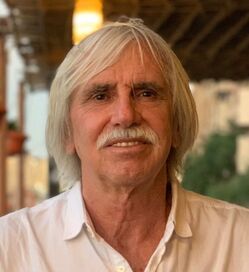
J. Stephen Lansing an external professor at the Santa Fe Institute, birthplace of complexity theory, an emeritus professor of anthropology at the University of Arizona. Before moving to Arizona in 1998, Lansing held joint appointments at the University of Michigan in the School of Natural Resources & Environment and the Department of Anthropology, and earlier chaired the anthropology department of the University of Southern California. He has been a Fellow at the Institute for Advanced Study at Princeton, the Center for Advanced Study in the Behavioral Sciences at Stanford, the Institute of Advanced Study at Durham University, the Santa Fe Institute, the Stockholm Resilience Center and the Eijkman Institute for Molecular Biology in Jakarta. He is President-elect of the Anthropology and Environment Society of the American Anthropological Association.
In the 1980’s, Lansing and ecologist James Kremer showed that Balinese water temple networks can self-organize. Later research showed that over the centuries, water temple networks expanded to manage the ecology of rice terraces at the scale of whole watersheds. In 2012, Bali’s water temple networks were recognized as a UNESCO World Heritage. In 2019, the story of the water temple research is the focus of an exhibition by a team of architexts, artists and researchers from ETH Zurich at the Sharjah Architecture Triennial, "the rights of future generations" (www.sharjaharchitecture.org).
As the pieces of the water temple story were falling into place, Lansing became interested in self-organizing processes elsewhere in the archipelago. In 2000 he began to work with Indonesian geneticists, linguists and public health officials to study the co-evolution of social structure, language change and disease resistance on fourteen Indonesian islands. The story of this project is told in Islands of Order: A Guide to Complexity Modeling for the Social Sciences
(Princeton University Press 2019 and companion website https://www.islandsoforder.com).
Lansing’s current research focuses on two projects: the discovery of a Song language spoken by a community of cave-dwelling hunter-gatherers in Borneo, and the reduction of greenhouse gas emissions from rice agriculture in Indonesia.
In May 2018 Lansing led a team that discovered a group of cave-dwelling hunter-gatherers in Indonesian Borneo, and a year later began working with the Leakey Foundation and the Nature Conservancy to help the Cave Punan preserve their forests. More than half of Borneo's forest cover is already gone, and at current rates of deforestation the remaining lowland forests (and with them a large share of the Earth's terrestrial biodiversity) will be lost well before the end of the century.[5] In 2022, with support from the Leakey Foundation and the Indonesian affiliate of the Nature Conservancy, the Regency of Bulungan declared their full support for the right of the Cave Punan to their forests as their ancestral heritage. [6] Like the farmers of Bali, the Cave Punan manage their relationship to the natural environment by consensus. Lansing's current research explores how the dynamics of these centuries-old systems of adaptive governance may be relevant to the as-yet-unmanaged global commons.
In the 1980’s, Lansing and ecologist James Kremer showed that Balinese water temple networks can self-organize. Later research showed that over the centuries, water temple networks expanded to manage the ecology of rice terraces at the scale of whole watersheds. In 2012, Bali’s water temple networks were recognized as a UNESCO World Heritage. In 2019, the story of the water temple research is the focus of an exhibition by a team of architexts, artists and researchers from ETH Zurich at the Sharjah Architecture Triennial, "the rights of future generations" (www.sharjaharchitecture.org).
As the pieces of the water temple story were falling into place, Lansing became interested in self-organizing processes elsewhere in the archipelago. In 2000 he began to work with Indonesian geneticists, linguists and public health officials to study the co-evolution of social structure, language change and disease resistance on fourteen Indonesian islands. The story of this project is told in Islands of Order: A Guide to Complexity Modeling for the Social Sciences
(Princeton University Press 2019 and companion website https://www.islandsoforder.com).
Lansing’s current research focuses on two projects: the discovery of a Song language spoken by a community of cave-dwelling hunter-gatherers in Borneo, and the reduction of greenhouse gas emissions from rice agriculture in Indonesia.
In May 2018 Lansing led a team that discovered a group of cave-dwelling hunter-gatherers in Indonesian Borneo, and a year later began working with the Leakey Foundation and the Nature Conservancy to help the Cave Punan preserve their forests. More than half of Borneo's forest cover is already gone, and at current rates of deforestation the remaining lowland forests (and with them a large share of the Earth's terrestrial biodiversity) will be lost well before the end of the century.[5] In 2022, with support from the Leakey Foundation and the Indonesian affiliate of the Nature Conservancy, the Regency of Bulungan declared their full support for the right of the Cave Punan to their forests as their ancestral heritage. [6] Like the farmers of Bali, the Cave Punan manage their relationship to the natural environment by consensus. Lansing's current research explores how the dynamics of these centuries-old systems of adaptive governance may be relevant to the as-yet-unmanaged global commons.